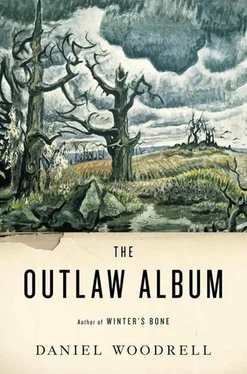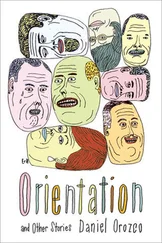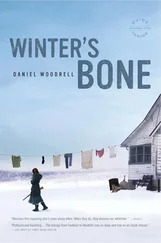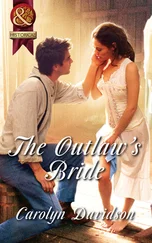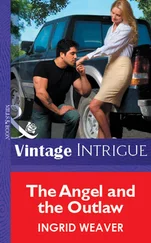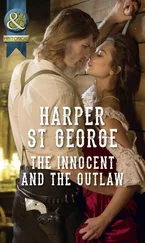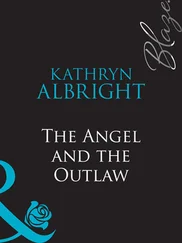As I worked to make the Dutchman’s end a proper one, he began to talk to me. The situation had sunk in on the family and they had become dull. The Dutchman wiggle-waggled in that alien tongue. I acted put-upon by having thus to illustrate my skill in oddball dialects, lest I be watched for signs of pride in my parents’ tongue.
“We care nothing for the war,” the Dutchman said. I fitted the noose with thirteen coils around his neck. “We are for Utah Territory. Utah. This is not a war in Utah, we learn.”
“This war is everywhere,” I said.
“I am no negro stealer. I am barrel maker.”
“You are Union.”
“I am for Utah Territory.”
Mackeson threw the rope over a cottonwood branch and tied it to the trunk. Some of the other boys hustled the Dutchman onto the seat of the wagon, startling the team and setting off screeches of metal on wood, mules, and women.
I stepped back from the wagon’s path, then turned to Black John.
“He says he is not a Union man,” I said. “He was codded by our costumes.”
“Sure he says that,” Mackeson said. “Dutchman don’t mean fool.”
“He does, does he?” Black John said. He was remounted and others were following suit. “Well, he should’ve hung by his convictions rather than live by the lie.” Black John nodded to Mackeson. “He’s a goddamn Dutchman anyhow, and I don’t much care.”
Mackeson slapped the mules on the rump and the Dutchman swung.
“One less Dutchman,” Coleman Younger said.
They all watched me, as they always did, when wrong-hearted Dutchmen were converted by us. I mounted my bay slowly, elaborately cool about the affair.
The woman was grieved beyond utterance, the little girl whimpered behind her. The boy walked beneath his father’s dancing boots, then made a move to loosen the rope about the cottonwood trunk. He was close to fourteen and still foreign to his toes.
I gave no warning but the cocking of my Navy Colt and booked the boy passage with his father. My face was profound, I hope, when I turned to Black John.
“Pups make hounds,” I said. “And there are hounds enough.”
Black John nodded, then solemnly said, “Jake Roedel, you are a rare Dutchman.”
Mackeson looked at me as if I were something hogs had vomited.
“Did you see that?” he asked. “Shot the boy in the back! Couldn’t shoot him face-to-face. Goddamn Dutchman! Why’d you shoot him from the back?”
“I am tender toward boys,” I said. “But I would put a ball in your face, Mackeson, should affairs so dictate.”
Black John then repeated himself on the sort of Dutchman I was, and we moved on to the silence of the family’s pain. I positioned myself so that Pitt Mackeson’s shoulder blades were ever visible to me.
Near dark, we shed our blue sheep’s clothing. We were to rendezvous with Captain Quantrill west of Lone Jack, just above Blue Cut.
Camp was pitched and pickets put out while there was yet light to the day. Letters were written to homefolks by those that could, and rents in clothing were mended. Several of the boys, ever playful and game for fun, began to boot a ball of leather about the campsite, whiskey, as always, the victor’s plunder.
I strolled about the camp whittling on a hickory branch that I had fated to be a water ladle. I watched the boys gambol on the grass but had not the spirit for games. I scooped the wood away, leaving a deep dish, intending this depth to aid in the settling of mud before drinking.
I squatted next to Coleman Younger, who had a bottle of whiskey that he had not won but that he intended to drink. He did not look my way when he handed the bottle to me. I dropped the ladle and sheathed my knife, then accepted the bottle. I appreciated his generosity to the measure of a quarter-pint on the first swallow.
“Do not think you are a good man,” Coleman Younger said. “The thought will spoil you.”
“I am a southern man,” I said. “And that is as good as any man that lived ’til he died.”
Coleman Younger was reddish in skin and hair with the temperament that is wed to that hue, and girth and grit enough to back it up.
“You are a southern man—that is proven,” Coleman Younger said. “But a rare one.”
For Coleman Younger to speak of me so set a glow in me that whiskey could not match, nor doubt extinguish. It was for this that I searched, communion and levelness with people who were not mine by birth, but mine by the taking. We drank into the dark, then slept, our bedrolls but a rifle’s length apart.
In the night Captain Quantrill and his party had hallooed our pickets, then rode in and joined us. In the morning there was much cutting up as old comrades were reunited over salt pork and oat cakes. The James brothers from Clay County, Buck and Dingus as they were then known, frolicked with Coleman Younger, Arch Clements, and Black John. Captain Quantrill stood apart, his eyes flat beneath sleepy hoods, and his tongue wiping his lips like a frog sensing flies.
They had taken ten prisoners from the Union Home Guard at Waverly. General Ewing, the leader of the Union occupation scum for the entire district, had issued an order concerning rebels as a mass, and our sort in special, that said if caught we were to be tried and hanged, or shot, whichever took less trouble. This led to some debate among us as to what we should do with the Yankees now in our possession. There were a few among the prisoners known personally to some of us from before the hostilities. There was a sunken-chested, half-sized one among them I knew as Alf Bowden, who hailed from my town. I had once helped him raise a barn on a summer day and danced with his sister ’til her face flushed and we both sweated, but I was not in his debt, nor he in mine. It was a good war for settling debts—some were settled before they were incurred, no doubt—but thin-skinned fairness rarely crabbed youthful aim. Alf said hello to me and I to him, but the courtesy of that situation required no more than that, so there we left it. It would be sad to see him killed, but sadness was on the flourish in those times.
There was no rain on the wind, only the smell of thawed mud and early blossoms, but the boys were lazied by the previous days, so we made a carnival of the camp and sought no demonstrations with our enemy. The ball of leather was trotted out, with nearly the whole of both parties joining in on the sport, stomping the mud into a glue that sucked down boots and held them there. The whiskey was running low and this raised tempers. Riley Crawford, not yet sixteen but the deadest shot among us, missed the ball with a kick of vigor and shinned Big Bob Flannery. Big Bob knotted him one on the head, and Riley cut him under the armpit by reflex. Captain Quantrill then snatched up the ball and hid it away, saying he would shoot any of us who murdered a comrade.
After the noon meal, Captain Quantrill and Black John announced that there would be haircuts for all, because we were to be disguised as Yankees once more for a ride into the Union district around Lexington, and our rebel locks would be noticed. There was much grumbling about this, for our locks were of the southern style and our pride and banner. “I’d rather robe myself with dog skins,” Big Bob Flannery said. “For if we must look like Yankees to win, we will be defeated in victory.” The bulk of us saw the sense in the notion, however, and went along with it, shaving and cutting our hair as if spiffying up for a church dance, but Big Bob had to be held down while Arch Clements harvested his hair patch. Little Arch being that close to his scalp with a Bowie knife sobered Big Bob, for he, like all of us, had witnessed the fashion in which Arch barbered dead, and practically dead, Yankees.
After that Coleman Younger, Little Arch, Pitt Mackeson, and me sat under the husky tree that the prisoners were roped to. Captain Quantrill had made a present to Coleman Younger of a new Enfield rifle that had been captured. We admired the weapon and made chat about its supposed power, the prisoners joining in with a remark here and there.
Читать дальше
